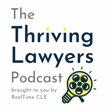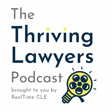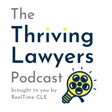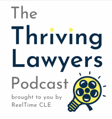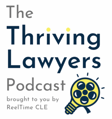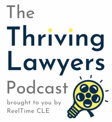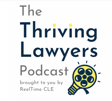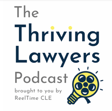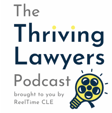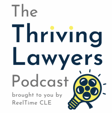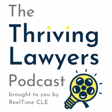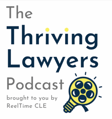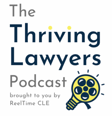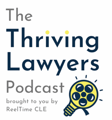Introduction and Background
00:00:09
Speaker
Hi there and welcome to this episode of the Thriving Lawyers Podcast. I am Chris Osborne, one of your hosts here. We're joined by my colleague and partner in crime, Michael Kahn. We are the founders of
00:00:26
Speaker
Real-Time Creative Learning Experiences, formerly known as Real-Time CLE, and we are a nationwide provider of continuing legal education as well as professional development programs focused on mental health and well-being and how those topics intersect with ethical decision-making, diversity and inclusion, and sexual misconduct prevention. And we are excited today to have as our guests the authors of a cool book called How to Be a Lawyer.
Guest Introductions and Initial Stories
00:00:56
Speaker
uh, the path from law school to success, Jason Mendelson and Alex Paul. Uh, and so we're excited to get right into our content today. Thanks for being with us. Uh, if you do enjoy our content, please be sure to like subscribe and review the thriving lawyers podcast. Uh, so, uh, Michael, welcome. Uh, I don't think we've done a podcast together in a while. We've, we've sort of handed off the hosting duty. So how are you feeling?
00:01:21
Speaker
I know it's exciting. I'll share a little bit of the sausage making. We actually struggled to get this started this morning because we hadn't done it together for a while. We've got four folks on this podcast. This is going to be fun.
00:01:36
Speaker
Absolutely. So Jason and Alex, would you guys please introduce yourselves and introduce yourselves. I'm going to give you kind of just a softball question, like obviously kind of what was your past sort of what do you do now, I guess, and we'll get more of the backstory and history of kind of your career as a lawyer. But I would say I want to give you this sort of icebreaker question of what's the most curious or strangest thing that you experienced?
00:02:04
Speaker
either practicing or teaching about law? What's something kind of curious or like just one of those head scratcher or weird sort of moments?
00:02:11
Speaker
Well, this is Jason Mendelson. My head-scratching moment would be I was working as a general counsel at a venture capital firm. We were winding down a company. We hired a person to do all the cross the T's and dot the I's and wind this thing down so there wouldn't be any liability left for the board. And by the way, in venture, half the companies go bankrupt. So this is not an abnormal thing. And I got a call from somebody saying, hey, where's all the money in the account? And I said, what?
00:02:38
Speaker
Turns out the guy wasn't who he said he was that was doing the wind down. He was hired by the other venture firm, not me. And he actually took the money and as far as we know, bought missiles for Hezbollah and Syria.
00:02:52
Speaker
and was found several years later, extracted out of the Middle East. I was one of the chief witnesses for his trial. How about that? Is that a head scratcher? That is a head scratcher. That's a full body scratcher, actually. I know. Alex, what's yours? How are you going to top terrorism connection? Certainly nothing that exciting.
00:03:16
Speaker
But I would say that when I was a young lawyer, one of the things that I decided to do because of my experience in law school is to put myself out there in uncomfortable situations. So I was taking pro bono, low asset level divorce cases and very contentious divorce and was
00:03:41
Speaker
in the mediation and a spouse of my client was the husband turned on me and started personally attacking me. And this is the early days of the internet and found out things on the internet about me, my young kids and and it just
00:04:03
Speaker
blew me away. I know divorce lawyers are familiar with this all the time. Family law, it's a very acrimonious setting, but that you have to stay calm and
00:04:16
Speaker
you know, then afterwards go for a restraining order. But, you know, just- As one does. Right. But as that quick, you know, that quick cross from, you know, professional where things are difficult into a very personal and kind of vicious space was still walk away from that. And, you know,
00:04:43
Speaker
Suddenly, Michael and Chris were going, who did we just get on this? No, this is this is local color. This is this is we like interesting people who have done interesting things for sure. Michael, do you have an answer to my question? I do, actually. This is when I was not a lawyer yet. I was still in law school and I worked for a summer for a criminal defense lawyer in Pennsylvania. I went to law school at Dickinson in Carlisle. And we went to this guy was very eccentric.
00:05:12
Speaker
very eccentric. He didn't have any ties or jackets or anything. I remember when a TV station was coming to interview him, he said, give me your jacket and your tie. He had to borrow my jacket and tie to do the interview. But I went to a hearing with him. I don't remember what the hearing was about. He was defending a guy who was up for murder and potentially capital punishment. And he was examining a woman on the stand and he asked her, do you see the person
00:05:40
Speaker
who you are accusing of murder here in the room, and she points to me. That's not even
Motivations and Career Journeys
00:05:54
Speaker
the funniest part. That's funny, but he leads over to me and he says, you're effing going to jail.
00:06:06
Speaker
That's the best. And you turned him and said, you want it back? And I said, you know, of course I knew I didn't kill anybody, but there was nothing there that I thought, oh my god, I'm going to jail. Could that happen? Could that happen? Yeah, did I do something last night? I don't know if I've heard that story. We've worked together over 15 years, and I'm not sure I've heard that story. How has that not made it into a program? I know, right? Was there a physical resemblance at all?
00:06:36
Speaker
You know, I don't even remember. He was too shocked. His name, I'll give the lawyer a shout out, William Costopoulos. I think he's still practicing and a great guy. Great guy to work for. Very, as you can tell, fun guy to work for. And I learned a lot. My only other question is, what was your alibi?
00:06:59
Speaker
I mean, you said it was positive traction, right? It was something around that. Yes, right. That's good. One of us got that joke. One of us got that joke. Nice. Well, yeah, Mike, because I'm already good. Yeah. My answer to the question and sort of echoing a theme, I'm sure we'll get into because your book is a great, you know, I love that the motivation behind it is, hey, here's a bunch of stuff that we wish we had learned
00:07:26
Speaker
at some point in time, either in law school or certainly afterwards, other than by Hook or by Crook. You guys have felt like kindred spirits because that's where a lot of our CLEs have come from. A lot of the programming we've done is, why didn't anybody tell us this in law school or prepare us for this? Mine is, I remember I was representing, I was working for a small law firm, still a fairly young lawyer. I was introduced to this client by the partner I was working with said,
00:07:52
Speaker
We have a guy who used to work for a car dealership and he has been fired and he says it's because he blew the whistle on shady practices, deceptive and fraudulent practices at a car dealership. And I remember the partner saying, this guy's a boy scout. He's so upright and honest and tells the truth. And I'm like, well, he's working for a car dealer, but okay.
00:08:16
Speaker
And his contention was that he had blown the whistle. In North Carolina we have at-will employment. You can be fired for any reason except for one that violates public policy. And one is if you're a whistleblower, if you're saying, hey, I oppose these shady practices.
00:08:32
Speaker
And so I went and I was defending his deposition. And I kid you not, I think it was like a two-day deposition, maybe three. I just sit there while they put down transaction after transaction that was shady and fraudulent, that his fingerprints were all over. And things that he had done, you know, had gotten himself like really nice tires at discount price, you know, with nobody's authorization, all this stuff. And I remember like almost screaming at guys,
00:09:00
Speaker
What else am I going to learn today? Because he was so much not a Boy Scout. I was not prepared for that. And I don't know if we had just hadn't asked him the right questions or hadn't said, well, tell us, because he swore, no, they're doing this and this is bad and selling cars before they're off the boat and all this.
00:09:20
Speaker
He had done similar or authorized similar things. So he, in that case, ended up going away. But I remember it because it was both tactically and the case was frustrating because we lost. We had to pull out of that thing and run from it, which was terrible feeling, to happen on your watch. I didn't make it happen, but it happened and it kind of, but also I remember coming unglued.
00:09:41
Speaker
And like, you know, I don't know, I'm not equipped to handle this. This is, you know, not something that they said, by the way, sometimes your client's gonna be a lion's sack, you know what, and you need to be able to, like you said, you know, keep your cool. And we don't always, you know, there was certainly nothing when we went to law school about that. So tell us a little bit about you guys journey kind of into, how'd you get into law to start with? And then what was your journey sort of in practice? And how do you find yourself where you are today, whoever wants to get first?
00:10:11
Speaker
I'll tell you what, I think the four of us should write a book about crazy things that have happened and we can invite all of our friends and that is so true into what we actually learned. We can make an educational book that would be interesting to read because it'd all be based around crazy stories like this. Sorry, I didn't mean to interrupt. We would tell stories from the road because people share stuff with us as well. Actually, I'm sorry, but this isn't really a good idea. I remember I'm a mental health therapist now.
00:10:41
Speaker
And you'd go to workshops and hear these master therapists talk about how these successful situations with clients that they've had. And it's all about their successes. And then someone came out with a book that the master therapist shared where they messed up. And it was so validating for me as a young therapist to see, oh, these guys aren't perfect or these women aren't perfect either.
00:11:06
Speaker
So I think you may have an idea. After the podcast, let's chat a little bit more about this. Yeah, absolutely. We'll call it how not to be a lawyer. How not to be a lawyer. I was never going to read that yet. I've never really read that yet.
00:11:18
Speaker
All right, we'll keep this brief. I'll go first. So I never wanted to be a lawyer, probably like most people. I wanted to be a professional drummer, and I was for a while, and then I got injured and ended up getting a degree in economics and being unemployed coming out of undergrad. I had taught myself hacking, so I went into software engineer for Anderson Consulting. They actually hired a non-computer science grad hacker.
00:11:44
Speaker
And I did that for a number of years and then decided one day I wanted to be an entertainment lawyer. Arm was feeling better. I was playing drums in Dallas a bit. I'm like, you know, if I did this entertainment lawyer thing and it doesn't work out, I'm an entertainment lawyer. But maybe I get back in music somehow and around about way. I had a terrible idea. Go to Michigan for law school, spend some time out in LA, you know, interviewing for that summer position at
00:12:11
Speaker
in all the big entertainment law firms and realized, oh my gosh, this is not my people. These are not my people who are representing these musicians. In my experience, many entertainment lawyers are sacks of something that you mentioned.
00:12:27
Speaker
I went back to Michigan thinking I was going to drop out of law school. I met some people from the West Coast. They told me about this thing called venture capital and startups. I was told that I could keep my hair long and wear blue jeans and practice law. Since I had been a hacker, I'm like, okay, that might be my other thing. Sold. Sold. I went out, worked for Cooley. When I graduated, incredible firm, incredible experience. Got hired away by a client to be the general counsel to venture firm. Eventually became a venture capitalist, started my own.
00:12:55
Speaker
venture firm out here in Boulder, Colorado, where I was a full-time venture capitalist, but also the general counsel into 2018. Along the way, I spent 11 years being an adjunct professor at CU Law, which was sort of the impetus for this book. The impetus was like watching all my students graduate and then coming back over coffee going, hey, can you actually tell me what's going to happen when I graduate? Then in 2020, I retired from everything.
00:13:22
Speaker
And I've gone back into music full time. I now play drums with a number of well-known artists. I'm actually a producer. I'm going to produce Alla Black's next album. I just did his little single. And I spend a ton of time in the criminal justice reform space with an organization that I've created with my wife along with some other organizations. And then Alex has been a dear friend for a while.
00:13:45
Speaker
also Small World Story, which I won't ruin his punchline. He's also the CEO of the Wealth Management Company that we use. And then when I came up with the idea for the book, I went to him first and we started talking about it. And then the book came alive. Just one more plug. The book is not just Alex and I as authors. We've got 24 other guest authors of all shapes, sizes, ages, ethnicities, and professions that give their highlights and their wisdom as well.
00:14:11
Speaker
So that's been my path, and I'll either shut up or hand it over to Alex. Well, before you jump to Alex, you got a name drop a little bit more. Like you said, play drunk for some folks. Like who have you played for that we might have heard of? I've played for a bunch of folks. I mean, you know, Michael Kang, String Cheese Ensign, Aloe Black, Judith Hill, who else? In the old days, a bunch of the Detroit artists that were running around. So yeah, it's been a career. Very cool. Yeah.
00:14:41
Speaker
and then jay salin i gotta plug this jay salin is my stage name j-a-c-e-a-l-l-e-n jay salin yeah released an album last year it's got about two and a half million hits so far so i want to see what i do as a soloist that's out there as well
00:14:56
Speaker
And is it just you playing drums on that album? No, no. Okay. Sing, produce instruments, guest artists like Beyonce's bass player, Aki Burmese from Lake Street Dive, Avril Lavigne's musical director, Brad Hargreiss from Third Eye Blind. Fun? Yeah, yeah. Paige Turner, who was one of the finalists in The Voice. She's my co-conspirator on the album. Nice. That's one of the best names ever. Paige Turner's a good name. She's been an artist. She's been an author.
00:15:22
Speaker
Hey Jason, have you seen the documentary Count Me In on Netflix? I have not yet. It's up next. It's very good. I loved it. I'm not a drummer. I think you'll really get into it. Thank you.
Law School Experiences and Perspectives
00:15:33
Speaker
Awesome. All right, Alex.
00:15:38
Speaker
Like Jason, I didn't know that I wanted to become a lawyer. I wanted to go into business. My father was a successful business person, entrepreneur, really kind of my role model. And I was from a small town, Central Wisconsin, blue collar town, 20,000 people. So I went to a small college and then decided I wanted to go to law school because my dad's advice was,
00:16:04
Speaker
He had a law degree and an MBA, and he said that his law degree was a lot more helpful to him in business. He said, you can learn business by doing business. You can't, at least in our country, learn the law by doing it. And that allowed him to assess risk a lot more carefully in business.
00:16:25
Speaker
So I said, okay, first thing I want to do out of college is go to law school and looked at small law schools, small class sizes, settled on Northwestern, but made the classic mistake of thinking that Northwestern law school is in Evanston. And after I was accepted, I went down there and realized it's in the city.
00:16:51
Speaker
It's right actually in Chicago, yes. Right downtown. So for a kid who's 22, never lived in a town over 80,000 people, that was quite a shock. It was really good for me and this is something I think we touch on in the book is that
00:17:10
Speaker
getting outside of your comfort zone, putting yourself in experiences that are challenging are really important. I think one thing that Jason and I see with a lot of attorneys is that when they go to law school, they have a preconceived notion. Maybe it's from TV. Maybe it's from family as to what kind of lawyer they want to be. Maybe it's a corporate lawyer, a litigator, whatever it could be. But what we
00:17:37
Speaker
we found and I think our careers is that the serendipitous path is often the best. And it takes you places, opens your horizons, at least for me it did. And it was that experience in the urban city of Chicago. I thought I wanted to be a business lawyer, actually got involved in the legal clinic, really enjoyed the litigation side.
00:18:01
Speaker
probably wasn't very good at it, but it was a very challenging experience and brought me all sorts of other cool things. I clerked for the SEC out of law school. I clerked on the Wisconsin Supreme Court, which actually has a pretty big litigation component because you're reviewing a lot of cases coming up through the system.
00:18:22
Speaker
in a lot of criminal law cases. So all of that made me, I think, a much better lawyer and ultimately, I think, a better business person. So when I moved to Colorado, I followed my ideal of becoming an entrepreneur and have started three businesses. One is a trust company in Nevada.
00:18:44
Speaker
The other is a multifamily office here in Colorado, and Jason's a part of that. And then the other, the third one, which does also work with Jason, some of his organizations is
00:19:00
Speaker
philanthropy digital platform that makes giving to charities and causes a lot easier. So using technology to improve the way we give, trying to remove the tax and compliance burden and get it focused on the impact that people want to make.
00:19:21
Speaker
Nice. How did you guys first cross paths and run into each other then? Mutual friend at a party. This will be a joke if anybody was at that party. We're some of the youngest people at the party, which for those of you at home, we're not young. Not anymore. Young at heart, young and brave, but we would just spend at a party and my wife hit it off and we hit it off and we just started hanging out.
00:19:49
Speaker
And then just, you know, one of those situations where we met socially, but there was quick, deep respect of what each of us had done, all four of us. And, and then we, my wife and I don't have kids. We love their kids. And I'm sorry, this is a terrible thing to say when you don't have kids, but we totally judge people by how cold their kids are. You're just being honest. And so their kids are super freaking cool. So that added bonus points as well.
00:20:17
Speaker
Gotcha. Were you all still, either of you still in law at that point in time or had you both kind of moved into more entrepreneurial things, I guess? I was still at Foundry Group, which is the name of the venture firm that I started. So I was a lawyer up until, I was a venture capitalist, but even though we had a, we hired a general counsel in 2018, I was still doing law.
00:20:38
Speaker
and still teach at CU. Yeah, and I still actually have an off-counsel relationship with a firm that I started the Colorado office of Chicago firm that focuses on tax planning, trust in the state planning called Harrison. It's a pretty large national firm now. The founder of that firm is a very close friend of mine.
00:20:58
Speaker
Lou Harrison. So when I moved to Colorado, I worked with Lou to set up the Colorado office. I don't take on clients now. Harrison has a very strong office in Denver.
00:21:13
Speaker
still have a little bit of my foot in the door, but just to... I still have a bar card. I'm still in good standing in the state of California. Yeah. And what did you teach, Jason, when you taught at CU? Did you teach the same class or different classes every time? No, I taught the same class. It was called VC360, venture capital 360, and the original idea was that it was going to be about
00:21:37
Speaker
the entire venture ecosystem from a standpoint of people getting together to raise money as venture capitalists, to deploying that capital to folks like Galz or entrepreneurs, then all of the things that can go right and wrong in those relationships, including the sticky fiduciary duty things that can happen when you're on the board of a company and a fiduciary duty or limited partners as a venture capitalist.
00:22:00
Speaker
And what it became was sort of a critical thinking course, because we, we, we, it was, I had a co-professor, and the idea was that we, as we dove down years 3, 4, 5, realized that what we were teaching were skills, negotiation skills, empathy skills.
00:22:20
Speaker
Service skills I mean one of the things we talk on the book is if you want to be a service provider like if you think being a plumber sucks don't become a lawyer. It's no different. It's just we get paid a little more and the problems are different.
00:22:33
Speaker
But really trying to get this into the students' brains of, you know, this was the predecessor of what sort of started the book. But that's what the class was. It still exists. I'll be guest lecturing this fall. But I don't do it full-time anymore. COVID kind of beat it out of me doing it remote. Sure, sure. That's a big change for everybody, right?
00:22:55
Speaker
Well, I love that you guys even as you and we probably for we may have some listeners who who don't know exactly what venture capital means exactly other than what we've seen kind of on you know TV shows like billions of stuff, but
00:23:12
Speaker
In a sentence or two, what would you say venture capital involves? My attempted definition would be, you know, finding money and resources to help businesses get started. And that could be very simple, you know, small business, mom and pop things, but also complex, you know, high tech type stuff as well. But am I close? I don't know. You're close. You're close. Venture capital traditionally works this way. You have a general partnership, which is a bunch of investors or few investors.
00:23:42
Speaker
That one has relationships with people who want access to startups. And so first thing is I go and I find investors which could be anywhere from high net worth individuals to come, you know, endowments at universities to insurance companies to whatever it is and I raise money into a fund.
00:24:01
Speaker
And then I go locate entrepreneurs who are creating startups. And I want to use the word startups because startups are not mom and pop businesses. These are things that can grow exponentially quickly. If you look at the risk profile I mentioned earlier, half of startups go out of business.
00:24:18
Speaker
What I didn't tell you is that 20 or 30% of the other ones barely return your money. So this is an incredibly risky proposition. So we have to invest in companies that are going to have massive scale potential, change the world sort of possibilities in order to make their risk reward calculation work out.
00:24:38
Speaker
Okay, so it says given how few of them are actually going to succeed and get decent returns, they better be really good returns when it happens. Yeah, like 10x at a minimum if you're an early stage investor, which is what I was for my career, but you can have 100x or 1000x.
00:24:56
Speaker
So I'm curious, how did you all embrace that mindset when what we typically associate with the practice of law and legal education is the opposite? We are the most possibly risk averse profession there is, because we're trained to say, look out for this. This bad thing could happen. Don't do it because of this. How do you get those mindsets together?
00:25:20
Speaker
Yeah, I mean, I'll take a first swipe. And I mean, look, I think law school is super useful and then super stupid at the same time. I mean, we spent three years walking in the classrooms where something goes wrong every day. There's never a story about Jack and Jill get together and have a contract and the business goes great at the end.
00:25:37
Speaker
It's like somebody ends up with a hairy hand or somebody's running down a freaking platform with fireworks or like there's all this just everything goes wrong. And so risk is beaten out of us. I mean, I would love to hear Alex's answer of what gave him the risk tolerance to start three companies. I will just say that as a venture capitalist, you either fall in love with risk or you die. And a lot of lawyers who try to become venture capitalists were unsuccessful. I think for me, it was
00:26:04
Speaker
supporting myself as a drummer doesn't get much riskier than that. Like you were literally hand to mouth, gig to gig. Yeah, I never lost that risk taking attitude. This didn't mean that law school didn't teach me a lot about the mitigation and the important parts. But you know, look, if you're going to be a great lawyer, going up to an entrepreneur and saying no, because it's too risky is going to get you fired.
00:26:29
Speaker
the answer is i understand what you're trying to achieve let's get you the best result and i understand it's not going to be a perfect riskless situation but that's what we do in startup world i mean right how did you how did you fall back in love with risk well i i mean i i think growing up in a family where business were started and failed uh businesses were started and succeeded kind of allows you to see that
Risk, Failure, and Mentorship in Law
00:26:53
Speaker
I mean, that stuff can happen. And there's a lot of luck that goes into a successful business. There's a lot of hard work and grit, but there's a lot of hard work and grit that goes into a failed business. And sometimes it just doesn't work out. So there's no stigma with that. But one point I wanted to just return to on the venture capitalists is I don't know how VCs
00:27:18
Speaker
elsewhere in the country do it. But when you see Jason and the work he's did with Foundry is, and I've experienced firsthand in my businesses, he's a true partner. So it's not just, I would say it's about partnering with someone who helps you build your business rather than just provides the funding and the initial capital to get going. This is someone who every decision from
00:27:44
Speaker
you know, marketing plan to customer acquisition to HR issues is there with you every step of the way. And so it's a very, it's just having that partner all throughout the process. And when, if the business succeeds,
00:28:03
Speaker
you feel that this person really deserves that what people might say is an outsized reward because they're there from day one through every sort of setback and challenge that you face. So this might actually become kind of like a reverse therapy session, like really weird, but Michael and I are like, I know in my brain, I'm like, I'm wishing we had found you guys like 10 years ago.
00:28:25
Speaker
Because we've sort of been fumbling through being, as I was pricing law, Michael's a counselor, but we've been small business owners. And that's been one of, I think, of our challenges. And we have taken risks. And we've had, you know, I love what you're saying, when we've worked with great people who are also willing to take risks, we know, hey, people may or may not come to this. We're doing something different. It's been good for us. But it's a really hard environment to be in as well. We felt like we've sort of had to teach ourselves business. It's lovely. Look,
00:28:53
Speaker
But being a CEO or company founder is the loneliest job in the world. Yes. It's so lonely. It's intellectually lonely. By the way, it's lonely when you're at a law firm and you go in a house and you're the only lawyer. I think people don't understand that not having somebody next to you who's a partner
00:29:13
Speaker
breeds loneliness and when you don't have somebody outside who's a mentor you're lonely as well and i think the beauty of the venture capital model when it works is this mentorship model where i want to be the call that the ceo says i got i can't tell anybody at the office that i'm scared or well that's not gonna play well it was gonna freak out and what do i do and so yeah i mean it's
00:29:39
Speaker
Look, a part of our book is about if you don't want to be an armchair psychologist, don't go into law. And if you don't want to have empathy and don't want to practice empathy, don't go into the law. And if you're already in law school and these words are scary to you, please read this book and please read these chapters because it's common. There's no way to avoid it. I had no idea that being a venture capitalist was going to be all that times 100.
00:30:03
Speaker
I mean, I wasn't prepared for it, loved it. Also though, I think it got tiring after 20 years. Part of my reason I retired was kind of done with that.
00:30:15
Speaker
Well, you're singing from a sheet of music that we love singing from as well. I mean, that's what our workshops have been about for years, about bringing those kinds of skills, the things that aren't emphasized in law school, alongside learning the analytical left brain analysis stuff. All those, I loathe the term soft skills, I refuse to use it, I just set it for purpose of identification, but it's the power skills. But I'm fascinated to hear you as a,
00:30:41
Speaker
even as an investor or venture capitalist saying, I want to know when things are going wrong, because that might be something terrifying for a CEO or business owner to do to say, let me call the guy who's funding this whole operation and tell him I'm scared out of my wits. But when you cultivate that mindset from the start,
00:30:56
Speaker
And you say, I'm here for support. And you're inviting that trust. You're inviting that, I need to know. And you're kind of running counter to the instinct a lot of people have to, let's hide this, try to manage it myself, fix it myself so nobody finds out.
Law Firm Management and Business Skills
00:31:11
Speaker
And that's what tends to get people in trouble. Good luck with that. Good luck with you starting your first, second, or maybe third business versus somebody who's funded 400 businesses over the past 20 years.
00:31:23
Speaker
right? You know, there's, there's three ways to be, as I like to say, there's sort of three ways to be helpful. One is to be smart, which you can't really control, right? We got one with her, we got, we try to maximize. Two is your experience, which you don't really get to control either. I mean, to Alex's point, if you take, you make yourself uncomfortable, you can accelerate your experience, but you're not given everything. The three is be the most useful person in the room, and that you can control, like,
00:31:50
Speaker
Any of us can be the most useful person in any situation, depending on what we're willing to do. And I always tell entrepreneurs that, look, you can't control how smart you are. You can't control your experience. Let me be useful to you. Let me fill in that third gap. You already got my money. I can't get it back. We're partners at this point. And so, look, some VCs are jerks. They'll yell at the entrepreneur. It doesn't do any good. But in my case, it was, look, let's solve the problem together.
00:32:18
Speaker
When you are thinking about these principles, there are lots of them that would apply because a lot of our listeners or people who are lawyers, one thing they don't cover in law school, it's starting to change. I don't know what they do at CU, but the business of
00:32:34
Speaker
running a law firm. If you are a small firm lawyer, you are an entrepreneur. You are a business owner, and yet we sort of have frowned upon, you know, we're a professional out of business, but the reality is we've got to have some of that same support structure, that same sort of mindset. Can you speak to that, how some of the lessons you guys have learned, the things that you consider valuable might be helpful to people who are, you know, find themselves, hey, I know how to be a good lawyer. I'm not so sure I know how to run this whole business operation piece.
00:33:02
Speaker
Yeah, I mean, I think that goes to our point is to ask questions. I mean, in the law, there's
00:33:11
Speaker
lawyers love to hear themselves talk and there's lots of lawyers who successfully navigated that small shops you in your community even in where i grew up twenty twenty thousand people there were small firms where you know single multi uh... three-man shops where you could go and unfortunately they were generally all men in that town but uh... and you could go and
00:33:36
Speaker
take them to lunch, ask them how they've started their firm. What are the things that they're worried about? What do they keep keeps them up at night? How do they handle getting clients? How do they handle having collecting from clients? I think you have to rely on your community and no matter how small it is and I think you got to ask questions.
00:34:00
Speaker
Yeah, I'd see you, but what I didn't tell you was our VC 360 class. We stocked it with 40% of the MBAs and we would pair the MBAs up with the lawyers for projects and whatnot. And I would tease them. I would rip on the MBAs as being stupid, not getting grades. And it was fake grad school. And I've teach the lawyers about being idiots around math and not understanding the word margin.
00:34:24
Speaker
Okay. And for those of you who don't know what the word margin is, that means the profit, effectively the profit per hour, right? You can bill an hour at $300 an hour, but how much you're actually making once we figure out the cost. A lot of lawyers just at the very basic or any small firms don't even think about the word margin, which at the end of the day should be the only word that matters to your business. I think that
00:34:47
Speaker
I think that lawyers traditionally are terrible business runners. I think that there's a few of us, and I don't mean to pat myself on the back too much, but I did run the business of Foundry Group in the back office and all that. I did start a company where I was the original CEO. It's a completely different skillset. And I think one of the travesties of the American justice system is they don't allow non-lawyers to be partners at firms.
00:35:15
Speaker
right if i was running a law firm i would want to hire business runners marketing people and if they were great i would want to cut them in for profits but you can't do that because of the ethical rules and it's and it's not like this in other countries in other countries you can hire business people and
00:35:33
Speaker
So I think, I know there's moves afoot in different states to change this. There's also a move afoot nationally to change this. But I do think that it's really easy to get caught up in the day-to-day, billing hours rate and wanting to please your clients. Because if you're a great lawyer, you're really all about your clients and that's a good thing. But at the same day, at some point you got to be selfish and learn how to run a business.
00:35:56
Speaker
When we're starting to see more in larger law firms, they're hiring COOs or CFOs who are not just a lawyer who was willing or one of the partners who might have been able or it was their turn. I've seen in the different firms I've been in or consulted for at Bemuth all different kinds of selection models. A friend of mine was on the
00:36:17
Speaker
lawyer on the litigation, he managed the litigation practice group and then they're like, okay, now run the firm. And even that's not the same exact skill set. And he found himself like I am chairman of either the US operations or the local office or whatever. And it's a whole different mindset and you're right, it's comps differently. There at least is a growing willingness to admit, yes, we're lawyers, we're smart, but that does not mean we know everything. We don't have the substantive knowledge of accounting,
00:36:47
Speaker
HR business operation of marketing even knowing yeah business generation Conflict resolution. I mean what I find I do some consulting for law firms about their business models and I find it very funny You business the business model seems to be sort of polls law firms either take their best lawyers With the biggest books of business with the highest prestige and take them offline to run the firm or
00:37:13
Speaker
They take the lawyers who are administrative, who can't generate business, who nobody really respects as lawyers because they can't find clients, and they put them to lead the firm. Those are the two types of lawyers who lead large firms. And then there's all this stuff in the middle.
00:37:29
Speaker
None of them are involved. And either model sucks. Right, right. It's not out. There's a lot of there's misallocation of gifting strengths and the tasks that a job requires. Yeah, I mean, look, there's many there's multi there's several billion dollar law firms out there. Right. There's many of them now. Right. Billion dollar top line revenue. And I look at the management teams as a venture capitalist, I go, I would invest in that.
00:37:59
Speaker
Yeah, that's the wrong management team. Well, and we've seen a lot of fragility in that and we've seen how the, yeah, the different sides of it. I wanted to drill down in on, you know, the focus of your book is really, you know, towards sort of the individual, the person, I know you've got some things that address for people, you might go into big law, you might go into other things. We're really all about, we love, we've done so on small firm conferences, we've done training for larger law firms and
00:38:29
Speaker
And kind of our core, you know, of what we like to talk about is how can you thrive? What are some principles that can work for thriving wherever you are, whatever kind of setting you find in?
Thriving in Law: Mindset and Identity
00:38:41
Speaker
the title that you have in your chapter 14. First, it talks about just being the calmest person in the room and dealing with something that we do run into in law a lot, challenging personalities. What are some of the insights there that you've learned that can help people in just being better team players, better people to work with as we're trying to, whether it's build a business, build a law firm, or just practice even in a government or nonprofit type setting.
00:39:10
Speaker
I think for Jason and I, but one thing that's really helped us is not being myopic in terms of the law or our business career is everything. Having passions outside of that and developing those passions, spending time on those, working with them with the same sort of rigor that we do in our careers. And I think that allows you to have, as Jason says in the book, to have an identity apart from
00:39:38
Speaker
your professional career or your business career or anything like that and it gives you a confidence and i just a balance that i think is incredibly necessary yeah i i would say that the for me when i would get in the situations where there'd be a difficult player in the room or i could feel my adrenaline spiking
00:40:00
Speaker
I could say this is no different than me missing six notes in front of 10,000 people on stage. You're gonna be all right. You're gonna recover. Don't let it get to your head. Like if I blew up every time I was on, something went wrong on stage, oh my God, I would not be able to do what I do, right? And to Alex's point, having a well-rounded life isn't just good for mental health and having identity, which I think is step one, but it allows you in the heat of battle and when bullets are flying,
00:40:30
Speaker
to understand what it feels like to have a heart rate increase, to have an adrenaline increase, to feel anger, to feel shame, to feel embarrassment, all these things that you felt in other parts of your life, which you know, that there's not this, you know, fight or flight syndrome, which then takes the conversation, you know, AWOL for you and your client. And you actually introduced, um, you, you started jumping into the, uh,
00:40:55
Speaker
the area of thriving and how do we thrive as, as lawyers, um, and introduce the idea of self-talk, uh, when dealing with different person, difficult personality, or if you mess up on stage and how effective that is for you. Um, so one of the, one of the things in the, uh, in the book that, or one of the subheadings you've actually came up twice was having a learning mindset.
00:41:23
Speaker
And to me, I'm curious what you mean by that. Cause I know I will talk to lawyers about that a lot. Cause often, well, I won't go there and talk about what I, how I define that, but how do you define learning mindset? Well, I think we do it two ways. One is the obvious, which is if you're not learning more about your craft and about all that, then you're dead. You won't, you won't be able to generate it a good,
00:41:49
Speaker
You won't be a great lawyer. If you want to be a great lawyer, you got to keep learning. And I find litigators traditionally do that better than corporate folks because every case is something brand new, but that's the easy one. The harder one is a learning mindset about yourself and about what motivates you and what motivates the people around you and what keeps you happy and what doesn't because
00:42:09
Speaker
what made me happy in my 20s wasn't the same for my 30s and 40s and 50s. I will say the best piece of advice I've gotten in the past five years was from a gentleman named Jeff Pankis. I was struggling with, I'd screwed something up pretty badly and I was just down for like two or three days and he's a friend of mine and he said, hey,
00:42:29
Speaker
Why is this bothering so much like because it was a frickin stupid mistake like I saw this coming I screwed it up I'm too old and too experienced to make this and I used very colorful language I said I'm an effin idiot right and and and and he looked at me says I got a question for he says if your best friend Had made the same mistake and come to you and said Jason. I made this mistake. Would you have called him an effin idiot? That's right, and I said no
00:42:57
Speaker
And he said, well, what would you have said? And I was said, well, I said, Alex, like, you know what? You got four kids. You got three businesses. You're busy. You meant well. I understand where, why you made this. I probably would have made the same mistake. We live and we learned you're going to get past this because you're smarter than to figure this out. And he's like, so why wouldn't you treat yourself like your best friend?
00:43:20
Speaker
Why don't you practice self-compassion? Part of my learning mindset was actually studying this thing called self-compassion for a kid who grew up in inner-city Detroit in government subsidized housing. Not as my identity of self-compassion. My identity is still going to hit people in the face.
00:43:37
Speaker
Right. But it was unbelievable. Including yourself. Of course, definitely myself. Yeah. So when I go back to the long-winded answer of learning mindset, it's an all-encompassing thing to me that's going to make you a better lawyer, a happier person, a better husband, a better father, a better lawyer, a better drummer, a better everything. Continue to learn the best practices for life.
00:44:01
Speaker
Yeah, and Alex, I'll come to you in one second, but I would ask Alex, too, would you talk to your child like that, the way you talk to yourself? And hopefully the answer is no, right? No, absolutely. Maybe he talks to himself better than I do. We don't know this. Maybe he's more evolved than I am. There you go, Alex.
00:44:22
Speaker
And I think that's tough. I mean, we're all driven. We're all probably type A people. And so, yeah, I think we're always harder on ourselves than we are on others. I think so. That's always an ongoing challenge. But I think if you talk with
00:44:38
Speaker
any entrepreneur, if you talk with Jason, about how they learn. And you always learn from your mistakes. And entrepreneurs have that glasses, half-full mentality. And they know to embrace mistakes. I don't think you'll talk to a single entrepreneur in this country who would say, yeah, I had a great success, and I learned so much from that. It's always the businesses that failed, the opportunities they lost. And I have that every day. I had one this morning.
00:45:07
Speaker
Well, that's so important for lawyers to hear because as I'm, I'm a therapist now, I've practiced law for a few years, many years ago. I work, uh, see clients with the lawyer systems program in British Columbia, Canada. And often what I see with lawyers, and this is a generalization, of course, is lawyers have a fixed mindset, not a growth mindset, not a learning mindset. They think that they are finished products. And if they make a mistake, that's the end of the world.
00:45:36
Speaker
I shouldn't make a mistake. I should have everything figured out. And instead of having self-compassion, they beat themselves up and then they shut down. And when you shut down, you don't learn and grow. And so your message is really important for our listeners to hear that you learn from mistakes, you learn from failures. And for the two of you, I'm sure you've had plenty of failures because you've taken lots of risks.
Balancing Law and Personal Life
00:46:02
Speaker
I think we have, part of the challenge we have, at least having been a litigation attorney and not as much a transactional attorney, we have this adversity, this adverse reaction to failure because our cases are win-loss. True. And a lot of them are zero sum, not all of them. That's part of what got me out of practicing litigation actively and where I'm much happier as a mediator and a peacemaker and somebody trying to be a problem solver.
00:46:27
Speaker
because it is win-lose because somebody gets custody and somebody loses or you have to split it in a way and and people feel like they lose. The adversary system is sort of against us there because there's only two options um if you just you know kind of buy into that uh whereas uh everybody in the uh in fact I um I've been doing some uh
00:46:49
Speaker
just had some business coaching and stuff recently. And one of the things that, gosh, was worth every penny I paid to this coach was they said, when you're putting out this particular product or something, they said, treat it like a science experiment instead of a final exam.
00:47:03
Speaker
I was like, oh, dang, that's good. Because I recognized it exposed. I treat everything like a final exam. I got to crush it. I got to get it right on the first try. And that puts a lot of pressure on. And a lot of the things that we do as lawyers are sort of like that one hearing, one day, one argument, whatever.
00:47:20
Speaker
But a lot of the business works is you iterate, you try, you want to fail fast, learn from it and try something again. That's sort of how you deal with that dynamic. Yeah, I mean, look, it's one of the biggest mistakes junior lawyers make is thinking they got to be right.
00:47:37
Speaker
It's preposterous. You don't know shit. Pardon my French. You don't know anything coming out of law school. Nothing. And that's why we wrote the book and part of it, it's okay to make mistakes. It's okay to fail. Here's some strategies which can lessen your chances of making mistakes and lessen your failure, but you have to know you're going to fail. But Jason, let me interrupt you for a second there. I see young lawyers, young associates,
00:48:07
Speaker
And they're so scared of making mistakes because the pressure's on them to become partner. And they feel if I don't show that I can figure things out on my own, that I can handle the stress, that I can get the billable hours without making mistakes, then I'm not gonna become partner. So how do you respond, either of you or both of you, how do you respond to a young associate who's dealing with that? I'd say you're focusing on the wrong thing.
00:48:33
Speaker
It's not about making partners, it's about becoming a great lawyer and becoming a happy lawyer. If you are at a firm that that is not enough to make partner, you're at the wrong firm. And it's just simple as that. And your goal is to become a great human, a great lawyer in a sustainable way that you have mental health that will allow creativity to keep flowing, that will allow you to work the long hours, that will allow you not to make the stupid mistake that
00:49:02
Speaker
I made because I was overworked and tired and beat myself up for it. It's a bigger picture than make partner. You will not make partner if you're not a great lawyer and you're not mentally healthy. So that's the focus. And part of that in Capsule's learning mindset, failing, taking responsibility when you do, fixing your problems, also realizing that so few mistakes as a lawyer are unfixable.
00:49:30
Speaker
It doesn't mean you don't look stupid in front of this senior associate, and it doesn't mean that you might not have to be croned from the client. Okay, got it. We've all done it. But there's actually not, especially as an early lawyer, I would argue that if your employer puts you in a position to make a massive decision that destroys your client as a junior lawyer, that's a problem with your employer, not on you.
00:49:56
Speaker
Yeah, and in Canada, actually, they've got something called articling. I don't know if you've heard of that before. Yeah, which is fantastic. I wish the US had something like that, where out of law school, you work for nine or 10 months with a firm. And then you can, if you want to stay and the firm wants to offer you a job, then you can get a permanent position there. But at the least, for those first few months, you can get a flavor for what this place is like. And unfortunately, I've had
00:50:25
Speaker
actually two recent articling students who have had nightmare experiences at their law firms, just been abused and have both left. And they've had the opportunity to see that this is not a place I want to be. So Jason, I like your answer that get situated in a firm that is a good culture fit for you and values fit for you. And even if you pick the wrong one,
00:50:52
Speaker
You don't have to live by the firm's rules. You're not gonna be there forever. You know you picked the wrong firm. Use it to maximize the you, the brand of you, the excellence of you, the happiness of you. Like that can be done. As Alex said so eloquently, I'll say it worse than he is, he got a law degree because he thought that was a great backdrop for whatever he was gonna do, right? We learned critical thinking, we learned all these other things.
00:51:18
Speaker
This is not your last job. This is your first job. The days of staying at a firm for 30, 40 years, that's a different generation. It would happen, and congratulations if you're happy. Oh my gosh, I'm so happy for you, but always focus on you. That's one of the things I loved when I taught law school for the three years that I did, being able to speak to the students and say, there's so much
00:51:42
Speaker
Energy pressure expectation put on that first job Think of it as a first job. I know so I know a few people who found the firm and stayed there forever But that is not the majority and it certainly wasn't my story Lots of people have had to you know, try different say because they don't even tell you about everything you can do as a lawyer Now there's who comes on campus and recruits and what jobs are available And that's not the same as what all is out there. You know, you had to go and beat the bushes. So
00:52:11
Speaker
I tell my students your first job is a paid PhD.
00:52:16
Speaker
You are not done with your education. You got through grad school. Hala, congratulations. Yay, you know nothing. Now you're gonna go get your PhD, but guess what? Unlike every other school in the world, they're gonna pay you. That's your attitude. You're getting a paid PhD. So Jason, there's another phrase you said that I wanna seize on and maybe it's a song on your past album or maybe it'll be a song on your next album.
00:52:43
Speaker
The Happiness of You. That strikes me as that could be a song title. Don't you think? I don't know. If I come out with a song called The Happiness of You, I'm going to get routinely mocked by all my friends in Detroit. It sounds like it could be a good Herman's Hermit's song. Yeah. Or maybe Taylor Swift. The Happiness of You. Or actually, it sounds more like a commercial when I sing it that way. It does.
00:53:06
Speaker
Right. Paul Anka, maybe. Oh my God. You are James. Paul Anka was the first show I ever went to. He opened up for Sean Anna. That's how old I am. Oh my gosh. You did just date yourself there, didn't you? Alex, what do you think? We've been rambling about nothing in so far. I know you've got some thoughts. Well, you know, one thing I tell my kids and I tell other people that I'm mentoring is, you know, don't focus on the outcome. And to Jason's point is, I think when we go to law school, we're like, well, once I get
00:53:35
Speaker
Once I get the job at the big firm, and then you're at the big firm, once I get to be senior associate, and then once I get to be a partner, embrace the process. Really engage in the process. You're going to get a lot more enjoyment out of it. And understand that it's transient. I mean, just because it takes you 2x the time to solve a problem, it's not going to always take you 2x to solve that problem. And you can only bill for 70% of that or 50% of that.
00:54:02
Speaker
realize that's going to pass like all things do. But you're learning, you're developing, and you're adding to your brand, you're adding to your education, you're adding to that PhD. That's an intangible value that you can't put a number on. You're already speaking more comprehensively
00:54:22
Speaker
about just kind of that transition to being a young lawyer than really most of what most of us got in law school. It was get the jobs, go do the job, just go start. And I remember when I went to work for the, when I went to teach law school, they gave us a business book. They gave us the book, a YOL, probably familiar with Jim Collins is good to great, which I didn't read business books. I was an English major and a poli sci major. So I didn't know what business school was. I'm like,
00:54:50
Speaker
buy low, sell high, how hard is it? I don't get it. Location, location, location. Exactly. That's real estate. It wasn't interesting to me, but that was the first business book I read because, and it was fascinating because it was, here's companies, he pits companies that were at the same sort of position and had the same good things going for him, but some of them took off and some of them didn't. What's the difference? And he tried to look across industries and I was fascinated and I sort of started this journey of, oh my gosh, business principles are something to think about.
00:55:19
Speaker
that we could actually incorporate into if you're running a small firm, running a small business, or as we coach and counsel our clients. It helps to know their world if we're dealing with business. I think what you're talking about is the word perspective. I think we haven't used the word in this podcast, but it's underlined every discussion we've had. It's underlined how to survive the mistakes you make. It's how to be happy. It's how to be the calmest person in the room. It's how to have a learning mindset.
00:55:47
Speaker
It's all about having a perspective that's greater than being a lawyer, going back to the point of having an identity outside of being a lawyer. Otherwise, this profession will drive you insane. I'm going to steal Alex's line. Alex did some research and found out that the least two happy professions in the world were accounting and lawyers, but lawyers had higher degrees of substance abuse problems. What was the happiest? It was like lumberjack and what else? Basically anything outdoors. Anything outdoors. Yeah.
00:56:18
Speaker
I can't tell you how many times I've been in a bad situation where I can feel the mental anguish, insecurity, insanity, whatever you want, and being able to take a breath and remember that I am more than a lawyer.
00:56:34
Speaker
I have friends that love me, family that relies and loves me, relationships, music, running, hiking, always keeping a perspective that this job is not the end all be all. Me being a lawyer is not the end all be all. This client's problems, while I empathize and I want to help them, it's not my problem. I have to be able to go home at the end of the day.
00:57:00
Speaker
And I'm so happy that we can talk about the mental game because this was forbidden when the four of us came. Absolutely. It was a sign of weakness. If I'd had this conversation in my interviews with law firms, I would have been kicked out of the door. Couple things, Jason. I just want to follow up on with you on that. You said perspective, but the nice thing about your book is you discuss mentors. Yeah. And so it's also about others' perspectives that we shouldn't
00:57:30
Speaker
Be isolated and the only way we can only see things the way we see things. So you Jason, you shared that great conversation you had with with I don't know if he was a mentor, but helped you understand the whole idea of
00:57:44
Speaker
I think it was a story about it's okay to fail. It's okay to make mistakes. Self-compassion. It's about how you deal with the failure. Somebody catch you and catch how you're talking to yourself even. Yeah, so it's important for lawyers listening to have other perspectives, to hear from others. By the way, that little thing now, whenever I catch myself beating myself up and I actually force myself
00:58:10
Speaker
to pretend I'm talking to somebody like Alex. I literally do it in my brain. It's rewired.
00:58:17
Speaker
And it took me about six months to completely rewire my brain to now when I have one of those situations. I'm like, more in football coaching, rah, rah, rah, let's get him next time. And not falling down the depth of despair. Well, it is funny, Michael, I don't know if you're thinking the same thing I have, but Michael and I have spoken about this concept to lawyers, you know, around, literally around the world. And yet we still, you know, we're all sort of better coaches than players.
00:58:45
Speaker
uh you know we i want to be the player i want to be my player yeah michael and i have seen each other at at our moments when our self-talk is sort of the worst uh and and you know where we're like we know the we know the other person knows you know well that's not a healthy way to talk to yourself but
00:59:03
Speaker
you're in the midst of it when you're sort of beyond, you know, the moment is happening and you're sort of, you know, on that path. And I like how you all advocate for just, you know, you got to slow down, pause, get, regain perspective, talk to somebody, get outside, all those things. I talk to somebody in my head. I talk to, I pick a friend, an actual real person, and I've committed
00:59:24
Speaker
that as soon as I start going down that road, nope, not doing it. I noticed if I if I address myself by my full name, that's not a good conversation. Like that's dad's voice from this big. And yes, you know, I'm interested by the idea to what you said of the identity is more
00:59:45
Speaker
Michael and I have even started shifting with encouraging people to say, not, I am a lawyer, but rather, I practice the law. There is a thing that I do that is practicing law, and it's important, but it is not the only identity I have. That's been a journey for me as there was a time I was a professor, and then I had to let that identity go, but I still wish people would call me that. I like it.
01:00:08
Speaker
There's a guy who's the professor of rock and does these awesome YouTube videos just explaining these You know how certain songs came to be and how a lot of them were accidental stuff and I love it Have you watched Rick Beato then? Yes. I love Beato. Yeah. Yeah, it was amazing. Okay. Good
01:00:23
Speaker
So good. But I love, you know, but I had to let go of that identity because of the way my law school kind of, you know, history played out. Not mine, but the law school itself does not existing long gray, a failed story of venture capital. We can talk about another time. But but even now, you know, as I am not a litigator anymore, and letting go, it's, you know, I've been in a wrestling match about letting go of an identity, my identity as a lawyer. But if I remember myself, wait, my identity really is more
01:00:52
Speaker
That's just one of the descriptors you would use for me, and I hope it's not the only doggone one. Michael, but I didn't want to derail from, you had a couple of questions I think you want to go to or pick up on that. Well, actually, I do want to, I just want to go to Alex. I saw Alex, you're nodding your head vigorously. I'm just curious as to what you think about what Chris was saying.
01:01:13
Speaker
When I was in the Midwest and then if you're on the East Coast, people ask you, what do you do? And you say, well, I'm a lawyer, I'm an entrepreneur, I'm a whatever. And moving to Jason and I both live in this beautiful town that we love, Boulder, Colorado. And the big shock for me was when I moved here,
01:01:37
Speaker
about the same time Jason did, people want to ask me what I did. They couldn't care less. They said, what do you do on the weekend? What do you like to do outside? And first night I was here, I was talking to this cute girl at a bar and she said, what do you do? And I told her I was a ventricle. She says, I don't know if that is, don't care. What do you do outside? Oh, first night I had moved a bullet. I was like, got it. Got it.
01:02:01
Speaker
And so I tried to incorporate that wherever I am and try to flip the script and say, ask someone.
01:02:10
Speaker
avoid asking what their profession is or what their business is. And then I had a good piece of advice from a mentor who said, even when you get that question, you can turn that into, what is your passion? What is your purpose? So if someone asked me, what do I do? I work on helping people figure out how to,
01:02:36
Speaker
pass their wealth on in a much more positive way than we've experienced. Solve the problems of generational wealth. Do you remember the question you asked me? You probably don't. I remember it was really unique. When we met the night we met, you asked me how I was connected to the party.
Communication Skills and Future Plans
01:02:55
Speaker
And not what I did, but how I was connected to the party, which is a completely, because by the way, I could be a caterer. I could be Dan, it was guys named Dan, I could be his guitar teacher. I could work for him or with him, or it could have been an investor in him. And my answer was, oh, well, I've known Dan for a while, but my wife is their interior designer, which went in a totally different direction, right? And because you asked a question that wasn't limiting.
01:03:22
Speaker
and didn't force me to come up with, well, I'm a venture capitalist and I can because we're in the same ecosystem, blah, blah, blah, boring, boring, boring. That rule never ask a question you don't know the answer to. That is just for trial. That's right. Otherwise, in fact, Mike and I talk about this a lot, but one of the articles that changed my practice, but also my life, was an article called, How to Take Better Depositions and Possibly Improve Your Marriage.
01:03:51
Speaker
by not taking a deposition at your marriage. Exactly, exactly. It's basically about asking the questions and having curiosity and listening to the answer, active listening and caring about the answer and being curious. And so I remember the case I had going on, I was representing a lawyer who had been absolutely just slammed by a local paper and they were labeled as a crook and terrible stuff. And I was taking the deposition of the
01:04:16
Speaker
the guy who wrote the article itself that was published. It was a hatchet piece on my client. But I adopted this curiosity approach and this kind of active listing approach and it was money. It was so helpful. I learned he was actually a really good journalist, had his whole long background. He and I were having this great conversation. And then when it came time, he's like,
01:04:37
Speaker
what happened with this article. He came out, he didn't say it so straight out, but he was working for a bunch of hacks who basically, he became my star witness because I didn't treat him as the enemy. I didn't try to pin it down when you wrote this and you didn't know it, did you? Instead, I'm like, what? Tell me more about that. Oh, what do you usually do when you're doing that? And how does that work? And he gave me all this great stuff that I came back and was able to smack the employer with and he was kind of
01:05:00
Speaker
you know, not unhappy. Chris, as a as a fellow musician, I learned active listening as a musician, on stage, and jazz bands or jam bands where you are, you are working, right? You're not just listening, you're active. You're doing something. And at the same time, you're listening to everybody else is doing and having to make decisions in the moment and keep the heart rate down. And sometimes it goes off rails. And sometimes it doesn't. It was for those of you out there who
01:05:27
Speaker
do play music, I would highly encourage to realize the active listening skills you have that are completely transportable to the practice of law. That's a great point. Oh, I like that.
01:05:37
Speaker
Well, we're kind of getting at our timeframe, guys, here. You guys have been very generous to come and spend over an hour with us. I have a feeling we could talk more about other stuff. There's deeper stuff to dive into in your book. Maybe we'll bring you back for a second episode later down the road. In the meantime, where can folks find you if they want to know more about what you guys are up to? Obviously, the book is How to Be a Lawyer, the Path from Law School Success, Jason Mendelson and Alex Paul.
01:06:04
Speaker
Published by Wiley, I'm assuming is available Amazon in the usual places. It is available everywhere. Every deal by books are sold. I've always wanted to say that. And what so real quick in a sentence or two, what do you see? What's you guys vision for how you know, now given where you are at the, you know, published author, and you kind of step back from some of your ventures and things. But what's your you know, what's your
01:06:32
Speaker
engagement with the practice of law, do you think look like going forward? And what do you hope will happen from that engagement? You want to go first? You go first. Oh, good. Okay, put me on that. All right. I stumped him. I stumped him, Michael. No, I mean, my engagement of the law right now is evolving. I spend all of my time
01:06:55
Speaker
The only lawyer time I spend now is spent either teaching at CU or this book or what other ideas I'm going to have to try to help the next generation.
01:07:06
Speaker
have a better existence than we did or helping nonprofits being a way, way, way, way more experienced and better lawyer than they can usually afford and trying to help them because at the end of the day, we want our nonprofits to succeed. So that'll be my sort of lawyer path going forward for the foreseeable future, but it wouldn't surprise me if it changed because my whole life has been changed.
01:07:31
Speaker
Yeah, I love how you're normalizing the idea of transience and change. It's so counter to kind of how we're certainly talking to think. But yeah, how about you, Ox? Yeah, I see it as working more with my law school in Northwestern, and I'm still involved with the school. And I see it as really at a crossroads. And the practice of law is changing. There's a lot of
01:07:57
Speaker
you know, change in higher education, the cost is unsustainable. There's just a lot of challenges, I think, facing law schools going forward. And I hope that working with, we have a new leadership there that's, you know, embracing some new ideas. And I'm hoping that we can craft a model that would
01:08:19
Speaker
be an example to other schools across the country. It's hard. There's a lot of constituencies that are vested in keeping things the same.
01:08:31
Speaker
We'll definitely have to get you back to talk about that. That's something that we're passionate about as well and connected with folks who have been working and doing a lot of good work to try to bring more of these principles into play while you have the law students there, while they're moldable and shapeable and before we send them out into the world.
01:08:51
Speaker
Love to stay in touch about that sort of thing. I'm going to play our outro music now. And if you all hang with us, we'll chat with you once that's played and we stop recording. So thanks for joining us. Thanks for having us. Thank you.
01:09:06
Speaker
Thanks for listening to this episode of the Thriving Lawyers Podcast. We love hearing from our loyal listeners, so please feel free to email us any questions, comments, suggested topics, or guest recommendations at the following address, feedback at thrivinglawyerspodcast.com.
01:09:22
Speaker
The Thriving Lawyers Podcast is brought to you by Real-Time Creative Learning Experiences, a national provider of continuing legal education and professional development programs that leave participants engaged, encouraged, and equipped to pursue meaningful and sustainable change in their practices, their lives, and the organizations they work in. And by Osborne Conflict Resolution, your experience guides through the uncharted terrain of business and family law disputes based out of Charlotte, North Carolina. Thanks for listening, and we'll see you next time on The Thriving Lawyers Podcast.

